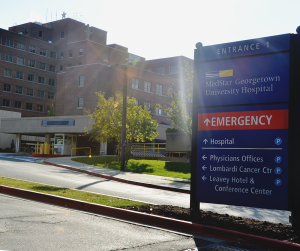Educational technology startup Ello will donate resources to provide educational support to children at MedStar Georgetown University Hospital to help curb the negative effects of extended school absence on child patients, as announced Aug. 27.
Ello, the company that founded an artificial intelligence-based (AI) reading assistance program of the same name, is sponsoring iPads and early-age children’s books for the children at MedStar undergoing long-term care. The partnership also includes donations to Children’s National Hospital in Washington, D.C., and will give the two hospitals free access to the Ello AI reading coach program to assist children with literacy skills development.
Dr. Elizabeth Adams, licensed clinical child psychologist and Ello co-founder, said her experience working with hospitalized children made her acutely aware of how quickly the losses in learning can add up.
“Early in my career working at hospitals, I noticed this loss of learning among young patients,” Adams wrote in a statement released by Ello. “I’m thrilled that Ello can be part of a solution for these patients and their families, to help with the literacy support they need while they are hospitalized while also giving them fun, engaging books and activities.”

Multiple studies from the American Academy of Pediatrics have indicated an association between extended periods of hospitalization and academic underperformance in literacy and numeracy standards among children of all ages.
Casey Goss (SON ’25), a nursing student who completed her pediatric clinical rotations at Children’s National during the Spring 2024 semester, said she witnessed firsthand the struggles related to long-term hospitalization.
“I’ve seen parents work hard to combat this, often by reading to their children, having them play educational games or even making them spell words while waiting for discharge,” Goss wrote to The Hoya. “However, this is no easy task for a parent, especially when they are managing so much else throughout their child’s hospitalizations.”
Katie Wallace, child life coordinator at MedStar Georgetown, said it was necessary to support hospitalized children’s education in pursuit of the hospital’s mission.
“We have a mission at our hospital of Cura Personalis, which is care of the whole person,” Wallace wrote to The Hoya. “When a child is ill, all aspects of their life are impacted. Having this new tool will help us meet the needs of those children when they are in the hospital.”
Dr. Michael J. Donnelly, assistant professor of medicine at Georgetown University School of Medicine and pediatrician-in-chief at MedStar Georgetown, said the donation will allow the hospital to support all of a young patient’s needs.
“It is vitally important for us to be able to keep children with chronic illnesses on track both with school and social functions,” Donnelly wrote to The Hoya.
Wallace said the donation will prove useful for the hospital’s existing pediatric educational support program.
“We are very lucky to have a position in our Child Life Department that specifically helps pediatric patients and families with school,” Wallace wrote. “When our school teacher is assessing patients or working with them at bedside, this app will be a great tool for her to use.”
The app uses adaptive learning, an educational method that utilizes AI to orchestrate customized learner-teacher interactions, to tailor to the needs of each child.
Goss said Ello’s AI program presents a unique opportunity for supporting children and contributing to a greater mission of advancements in education.
“I imagine this would be particularly helpful surrounding hospitalized children, who may be trying to make up for missed learning, or have difficulty learning in more traditional ways,” Goss wrote. “It is clear that Ello’s donation will have a positive impact on both children and families lucky enough to receive their products.”
“It is very important for us to have resources such as those donated by Ello to let these children just be children,” Donnelly wrote. “They are dealing with a lot, and this allows us to care for the whole person, not just their illness.”